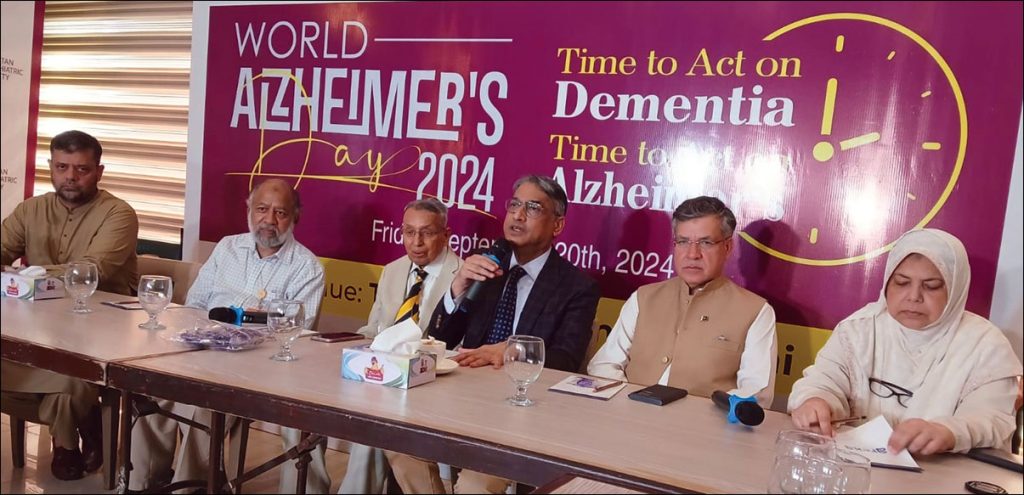World Alzheimer’s Day observed by PSN
KARACHI: Leading Experts in the field of neurology and psychiatry speaking on the World Alzheimer’s Day stressed the significance of raising awareness and challenging the stigma surrounding Alzheimer’s disease in our country, particularly among elders aged 60 and above where community involvement in caring for our aging population would create a more supportive environment for those affected by this condition. Family support was critical in Alzheimer’s care. “It not only improves the patient’s quality of life but also helps reduce the risk of caregiver burnout.”

Pakistan Society of Neurology arranged a press briefing to observe The World Alzheimer’s Day which is celebrated on 21st September all over the World. Photograph taken at the occasion shows sitting in the dais from (L to R) Prof, Abdul Malik, Prof, M Wasay, Prof. Ejaz Ahmed Vohra, Prof. Bashir Soomro,
Prof. Iqbal Afridi and Prof, Naila Shahbaz.
The World Alzheimer’s Day is observed on 21st September all over the World and the theme for the years 2024 was “Time to act on dementia, Time to act on Alzheimer’s.”In Karachi Pakistan Society of Neurology arranged a press briefing to create awareness through print and electronic media which was addressed by Prof. Ejaz Ahmed Vohra, Prof. Bashir Soomro, Prof. Iqbal Afridi, Prof, M Wasay. Prof, Nila Shahbaz and Prof, Abdul Malik.
Prof. Iqbal Afridi speaking at the occasion said that Vascular Dementia is very common. There’s no certain way to prevent all types of dementia, however, there’s good evidence that a healthy lifestyle can help reduce risk of developing dementia in old age. A healthy lifestyle can also help prevent cardiovascular diseases, such as stroke and heart attacks, which are themselves risk factors for Alzheimer’s disease and vascular dementia. It also helps to improve Quality of life and also helps to slow down the progress of the disease beside reduction in burden on care givers. We should have old age friendly furniture and bathrooms to prevent injuries, he added.
Prof. Bashir Soomro in his remarks said that we are lucky that we have caregivers in the shape of family system which is a gift of God. We need to train care givers and provide some support. When family members are informed and involved in the care process, they can better understand the patient’s needs and provide personalized support.
Prof, Nila Shahbaz pointed out that Vascular Dementia is very common in South East Asia. Blood Pressure, Blood Sugar and cholesterol must be controlled to slow progress of the disease. Dementia usually develops because of a combination of genetic and environmental factors, such as smoking and a lack of regular exercise, sedentary life style and air pollution etc. Control of risk factors is important to control the disease. Contact with people with dementia is very important and we need improve the care at home not at old age homes.
Prof. M. Wasay pointed out that treatment of Alzheimer’s was prolonged and if the treatment was not started in time, the disease become untreatable. This disease can be treated, we can slow the progress of the disease but it needs early diagnosis and effective treatment. We must counsel with patient’s family members so they can improve the quality of patient’s life with utmost respect. He urged the government to play its role in prevention by providing facilities for elderly patients by providing medicines at affordable price besides treatment.
Prof. Ejaz Ahmed Vohra emphasized on patient care by strengthening the family system and social networks so that the children take care of their parents. We should establish community centers with our mosques instead of old age homes, where facilities are provided for elderly people. Community centers can be important hubs that give people an opportunity to socialize, learn and spend time. By reaching out and connecting with others who are going through similar experiences, families can find the help and guidance they need to provide the best possible care for their loved ones. The growing burden of Alzheimer’s in Pakistan needs improvement in our infrastructure and training to provide better care for older adults and support their families he added.
Earlier Prof. Abdul Malik in his introductory remarks said that Alzheimer’s disease affects the elderly people and currently 4.3 per cent of the population of Pakistan is over 60 years of age. Due to this, the number of dementia patients in the country is also increasing which needs proper guidance and awareness. The aim of Pakistan Society of Neurology is to create awareness to prevent and treat Alzheimer’s disease at an early stage, print and electronic media can play very important role in this regard he added.



